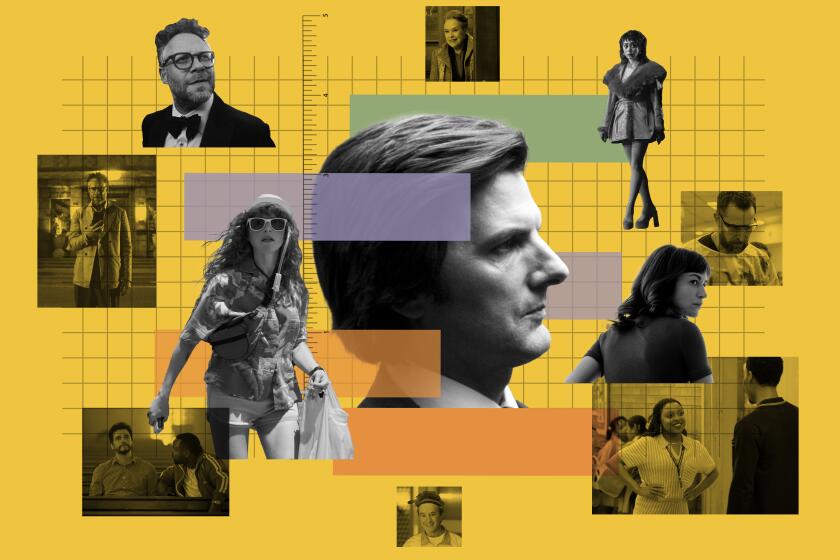The Envelope: From ‘Dynasty’ to ‘Empire,’ the prime-time soap has bubbled up again
- Share via
Although every television format and genre has been declared dead only to be triumphantly revived several times over, the prime-time soap opera is experiencing a resurgence like no other, particularly on network TV. From PBS’ historical costume drama “Downton Abbey” to ABC’s “Nashville” to Fox’s newest hit “Empire” to every series Shonda Rhimes has created (“Grey’s Anatomy,” “Scandal,” “How to Get Away With Murder”), melodrama, intrigue and romance are back.
Unlike the ‘80s glory days of such ratings-grabbing series as CBS’ “Dallas” and ABC’s “Dynasty” and the ‘90s revivals from Fox — “90210” and “Melrose Place” — none of which earned much award attention, Emmy voters are taking notice of this new generation of guilty pleasures. Both “Downton” and “Scandal” have earned multiple nominations and wins, and “Empire” has the potential to follow in their footsteps.
“There is a huge appetite for soaps,” says “Downton” producer Gareth Neame. “Millions and millions of people were watching ‘Dallas’ in prime time back in the day. What we’re able to do is to combine that basic love of serialized drama with ongoing characters and production value.”
But in a landscape filled with dramatic arcs that are no longer contained within a single episode, making the distinction between serialized drama and full-on soap can be tricky.
“Everything is serialized anymore, really,” says “Nashville” show runner Dee Johnson, who also happened to get her start on “Melrose Place.” “It’s an old-fashioned term, ‘soap opera,’ based on the old days of those daytime shows — not to disparage those in any way, but it’s a very different medium. Where do you draw the line?”
“Most dramas are soap operas and most soap operas are drama,” adds Mark Schwahn, creator of E!’s monarchy drama “The Royals.” “You expect not only a heightened situation but a bit of fashion, a bit of style, a bit of glitz and glamour.”
Even before ABC’s “Desperate Housewives” competed at the Emmys in the comedy category in 2005, the line started blurring. “Downton” writer Julian Fellowes credits American television for pushing TV further into serialized territory.
“Shows like ‘The West Wing’ and ‘ER’ and even ‘NYPD Blue,’ [with] 16 stories per episode, some of them spanning the whole arc, that was really developed on American television when England was still doing the single-story episode,” Fellowes says. “That pace had a kind of energy inevitably. Before that, you could get up and go to the kitchen and make yourself a cup of coffee and a sandwich and come back and you hadn’t really missed anything.”
The serialized pace also allows the audience to engage with characters as they grow and change, which has always been the primary appeal of soaps. The trick is avoiding clichés.
“There are certain devices that we have become familiar with over time because we’ve grown up with television,” Schwahn explains. “Just say ‘evil twin’ and everybody laughs because if you’re doing ‘evil twin,’ you’ve lost your way. We’re asking the questions of, ‘What haven’t we seen? What haven’t we done?’ There are two reasons we haven’t seen it before: Either it’s revolutionary and great, or it’s really horrible. We always have to be mindful of which side of that we’re on.”
Johnson agrees, saying it’s unlikely “Nashville” will suddenly introduce a zombie country singer, but adds, “Under the right circumstances, most people are capable of almost anything. We have certainly done some darker things and some intense things, but we try to stay true to the characters’ particular journey.”
Remaining rooted in reality also helps keep “Downton” from veering too far into soap territory.
“The experience of being a soap character is pretty extreme, whereas serial drama strives to stay on the other side of that line from unreality,” Fellowes says. “When you do have an extreme circumstance in a serial drama, you try to give the other characters the response that they would have in real life. That gives them a dimension that people identify with and allows them to be taken more seriously.”
Staying true to character and the real world could help soapy serials like “Empire” gain Emmy attention, but Schwahn says the label is still an obstacle.
“We’re considered fast food, like we’re not tackling important issues,” he says. “You’ll see some great performances and you’ll see episodes that are Emmy-worthy, but I think the prevailing thought is, ‘Oh, that’s a soap opera. It’s not Emmy-worthy.’ It’s an archaic point of view.”
More to Read
Sign up for The Envelope
Get exclusive awards season news, in-depth interviews and columnist Glenn Whipp’s must-read analysis straight to your inbox.
You may occasionally receive promotional content from the Los Angeles Times.









